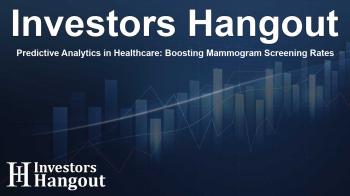Predictive Analytics in Healthcare: Boosting Mammogram Screening Rates

AI Transformation in Women's Healthcare
In today's rapidly evolving healthcare landscape, understanding trends in women’s health is crucial. Cedar Gate Technologies, a prominent company in value-based care technology, has reported significant findings that highlight the decreasing likelihood of women missing vital screening mammograms. This trend indicates a shift towards better preventive care practices.
Key Findings from Cedar Gate Technologies
Cedar Gate’s analysis reveals that in a 12-month period, nearly 42% of women were predicted to miss their recommended mammograms. This contrasts sharply with earlier statistics, where about 60% were expected to skip screenings. Such a notable reduction—almost 30%—reflects positive changes in healthcare delivery and women's engagement with preventative services.
Understanding the Predictive Analytics Model
The predictive model utilized by Cedar Gate specifically identifies women aged 40 to 75 who are eligible for mammograms, following guidelines from health authorities. By assigning a probability score, the model assesses which women are at risk of missing their screenings. Those scoring below 0.5 are flagged as “unlikely” to adhere to mammogram recommendations, emphasizing the role of analytics in healthcare.
The Impact of AI Technology on Preventive Care
David B. Snow, Jr., the Chairman & CEO of Cedar Gate Technologies, highlights that the integration of AI models plays a pivotal role in augmenting preventive healthcare measures, especially concerning breast cancer screenings. This technology allows providers to identify and prioritize patients who may be at higher risk for negligence regarding their screenings, thereby improving outcomes drastically.
National Trends in Cancer Screening
Research from various health organizations indicates an overall improvement in cancer screening rates following a decline due to the pandemic. As healthcare services recover, Cedar Gate’s findings align with national data suggesting that screenings are surpassing pre-pandemic levels. This represents a significant advancement in public health awareness and disease prevention strategies.
Addressing Barriers to Screening
Despite the positive trends, experts caution that the prediction of over 40% of women potentially skipping mammograms remains a concern. Gregory Shelton, MD, emphasizes the importance of identifying the barriers impacting women's decisions to get screened. Factors such as accessibility to healthcare, awareness, and educational resources are crucial to ensure comprehensive screening rates.
The Role of Cedar Gate’s Database in Healthcare Analytics
Cedar Gate’s National Healthcare Benchmark Database provides essential insights through de-identified data from millions of members across the country. This extensive data analysis allows organizations to benchmark their performance, helping stakeholders in healthcare—payers, providers, and employers—to bridge care gaps. The availability of over 20 predictive models empowers users to enhance patient outreach and ensure those at risk receive the care they need.
Understanding the Statistics on Mammogram Access
According to the latest statistics from health organizations, about one in four women aged 50 to 74 have missed a mammogram appointment within the last two years. Alarmingly, this percentage rises to 35% for women facing multiple health-related social challenges such as transportation difficulties or financial barriers. This data underscores the necessity for targeted interventions.
About Cedar Gate Technologies
Cedar Gate Technologies champions value-based healthcare through a comprehensive technology and services platform, integrating analytics, population health management, and payment solutions. By enhancing care coordination and operational effectiveness, Cedar Gate is dedicated to promoting health outcomes across various payment models and healthcare segments.
Frequently Asked Questions
What is the purpose of the predictive model used by Cedar Gate?
The predictive model identifies women aged 40 to 75 who may miss their mammograms and helps focus care interventions.
How much has the risk of missing mammograms declined?
The likelihood of women missing their mammograms has decreased by nearly 30% in recent years, which is a significant improvement.
Why is early breast cancer detection important?
Early detection through screening mammograms is vital for successful treatment outcomes and can significantly improve survival rates.
What challenges do women face in accessing mammogram screenings?
Challenges include transportation issues, financial constraints, and a lack of awareness regarding the importance of regular screenings.
How does Cedar Gate’s database support healthcare providers?
The database provides valuable analytics and benchmarking capabilities, helping healthcare providers identify care gaps and improve patient outcomes.
About The Author
Contact Lucas Young privately here. Or send an email with ATTN: Lucas Young as the subject to contact@investorshangout.com.
About Investors Hangout
Investors Hangout is a leading online stock forum for financial discussion and learning, offering a wide range of free tools and resources. It draws in traders of all levels, who exchange market knowledge, investigate trading tactics, and keep an eye on industry developments in real time. Featuring financial articles, stock message boards, quotes, charts, company profiles, and live news updates. Through cooperative learning and a wealth of informational resources, it helps users from novices creating their first portfolios to experts honing their techniques. Join Investors Hangout today: https://investorshangout.com/
The content of this article is based on factual, publicly available information and does not represent legal, financial, or investment advice. Investors Hangout does not offer financial advice, and the author is not a licensed financial advisor. Consult a qualified advisor before making any financial or investment decisions based on this article. This article should not be considered advice to purchase, sell, or hold any securities or other investments. If any of the material provided here is inaccurate, please contact us for corrections.

